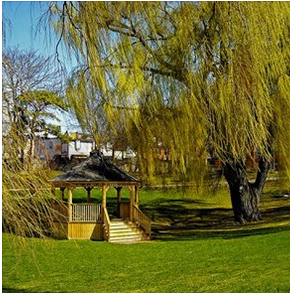 By Pepper Parr
By Pepper Parr
May 31st, 2016
BURLINGTON, ON
It wasn’t hard to see this one coming.
At a Sustainable Committee tour of Spencer Smith Park a few weeks ago, quiet mention was made of some problems with the giant willow trees next to the Gazebo close to the foot of Brant Street.
Now comes the announcement that the trees are beyond saving and are going to be cut down.

They lasted 70 years. Willows to be cut down.
The city announce earlier today that: “Two weeping willow trees near the gazebo in Spencer Smith Park will be removed starting June 7 to ensure public safety in the waterfront park.
The city’s arborists found significant rotting and areas of decay in the trees during a recent investigation. The city will bring tree removal equipment into the park on June 7 to remove most of the two trees. The trees’ eight-foot-high (2.4-metre-high) stumps will be removed after the Sound of Music Festival, which runs from June 16 to 19.
“The trees are beyond saving, unfortunately,” said Mary Battaglia, director of Roads and Parks Maintenance. “The trees need to be removed to ensure branches and limbs do not come down and cause injury.”
The two trees were from clippings transplanted in the 1950s by Spencer Smith, a local entrepreneur and long-time member of the Burlington Horticultural Society.
“The city recognizes the significance of the trees to the community, and to the park’s heritage,” said Mayor Rick Goldring. “I think we can be grateful that the trees have served us so well over the years.”

Spencer Smith, the man our lakeside park is named after, planted the willow trees 70 years ago.
The city will keep 70 clippings of the willow trees for rooting and replanting, one for each year of the trees’ lives. The healthy portions at the base of the trees will be kept for future art or woodworking opportunities.
“I am very sad that we are losing these willow trees that have framed so many memories in Spencer Smith Park. I am pleased we will take cuttings and are exploring ways to repurpose the wood to preserve the legacy of these trees planted from cuttings by Spencer Smith,” said Ward 2 Councillor Marianne Meed Ward. “I invite everyone to join me for a goodbye ceremony to share our collective memories.”
 Councillor Meed Ward will host a ceremony on Monday, June 6 at 7 p.m. near the gazebo in the east side of the park. People are encouraged to bring lawn chairs or blankets.
Councillor Meed Ward will host a ceremony on Monday, June 6 at 7 p.m. near the gazebo in the east side of the park. People are encouraged to bring lawn chairs or blankets.




















Weeping Willow (salix babylonica) is native to China. This tree was brought to Damascus, Syria via the Silk Road in ancient times. Later Weeping Willows became a landscaping standard in Europe and eventually most of the rest of the world.
I can appreciate this tree’s aesthetic beauty. Based on the out pouring of genuine sadness, I get that many people have an emotional attachment to this tree. However, its an alien species that doesn’t belong here. Weeping willows contribute almost nothing to our local ecosystem that could not also be accomplished with plastic. It isn’t a host plant for any native butterfly. In general its avoided by most native birds, bees and pollinators.
In some locations, this tree has invaded natural areas. IN South Africa, weeping willows are a serious ecological problem which cause habitat loss and threaten some of their native species with extinction.
The reason why I am writing is because I believe that plans to propagate 70 more copies of this tree is a bad idea. We are in the middle of a global biodiversity crisis, caused in part by our landscaping choices. Anyone living here 500 years ago would recognize almost nothing growing in Spencer Smith Park, urban Burlington and most of the GTA today. Even our “natural areas” are being over run by alien species that have escaped our urban areas. What is native and common has become rare and threatened with extinction. Alien species like this weeping willow have become common and cause serious ecological problems.
By all means, fill Spencer Smith Park with shade trees, but lets be wise about it. We must not base our landscaping choices on emotion or nostalgia, ignorant of the resulting ecological problems we create. We must balance the aesthetic, with ecological and environmental considerations. By that standard, lanscaping with weeping willows and all the other McTrees, McFlowers, and McGrasses taking over the planet to create a single dysfunctional global McEcosystem is a bad idea.
In the context of the current Anthropocene mass extinction event, we need to start seeing the landscapes under our control, the same way Noah saw his ark.
Suggestions: https://www.butterfly-fun-facts.com/gardening-plants/host-plants/many-tree-are-host-plants-for-butterflies-and-moths/
Yes what about the small creatures who call these willow trees home?
And I am sure there are raccoons who sleep up high in the majestic branches !!
Will they be taken care of or just left to fall as the limbs are chopped?
These trees should be left alone !! Put fencing around them and leave them be!!
They are part of our heritage and we should respect them not kill them!
If a petition starts up to save these trees count me in!
The whole waterfront is changing and not in a positive way. Now we will see the Lake without the willows standing tall, sturdy plus steadfast. The new generation will not remember more is the pity. Colour me sad in Burlington.
More trees lost ! Oh Boy.
My head aches with the sound of chain saws in Ward 2
Will the city at least replant another tree (s) in its place ? PLEASE.
Allen Jones
Will there be a service provided to observe the trees for young bird and squirrel nests prior to removal? These trees are the homes for many animals.
So sad